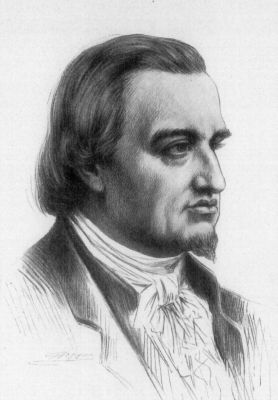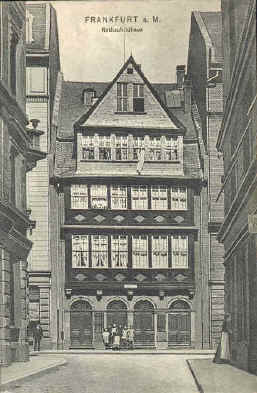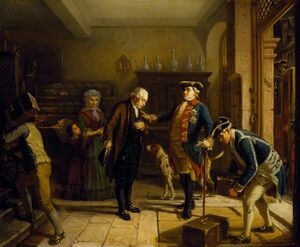ماير أمشل روتشيلد
ماير أمشل روتشيلد Mayer Amschel Rothschild | |
|---|---|
 | |
| وُلِدَ | 23 فبراير 1744 |
| توفي | 19 سبتمبر 1812 |
| اللقب | أسرة روتشيلد المصرفية |
| الزوج |
گوتلى شناپر (m. 1770–1812) |
| الأنجال | |
| الوالدان | |
| الديانة | يهودي |
ماير أمشل روتشيلد Mayer Amschel Rothschild (23 فبراير 1744 – 19 سبتمبر 1812)، هو مصرفي ألماني-يهودي ومؤسس أسرة روتشيلد المصرفية، والتي يعتقد أنها أصبحت أغنى أسرة في التاريخ الإنساني. يشار إليه على أنه "الأب المؤسس للمالية الدولية"، كان روتشيلد ترتيبه السابع على قائمة مجلة فوربس "لأكثر 20 رجل أعمال تأثيراً في جميع العصور" عام 2005.[1]
. . . . . . . . . . . . . . . . . . . . . . . . . . . . . . . . . . . . . . . . . . . . . . . . . . . . . . . . . . . . . . . . . . . . . . . . . . . . . . . . . . . . . . . . . . . . . . . . . . . . . . . . . . . . . . . . . . . . . . . . . . . . . . . . . . . . . . . . . . . . . . . . . . . . . . . . . . . . . . . . . . . . . . . .
حياته
 منزل عائلة روتشيلد في حارة اليهود بفرانكفورت |
وُلِد ماير[2] أمشل روتشيلد في 1744 في "حارة اليهود" (الگـِتو اليهودي) في فرانكفورت على الماين، الامبراطورية الرومانية المقدسة، واحداً من ثمانية أنجال لآمشل موزس روتشيلد (ت. 1755) وزوجته شونشه روتشيلد (لقب عائلتها لخنخ Lechnich، ت. 1756).[3][4]
يمكن تعقب أسلاف عائلة روتشيلد حتى عام 1577 إلى "إيزاك إلخنان روتشيلد"، الذي اشتق اسمه من البيت الذي كان يسكنه في حارة اليهود (يودنگاسى)—zum roten Schild ("عند علامة الدرع الأحمر").[5] حمل أحفاده وسلالته هذا الاسم كلقب للعائلة واحتفظوا به حين انتقلوا في 1664 لمنزل آخر في حارة اليهود—Hinterpfann (حرفياً "المنزل في ظهر القدْر")[6]—الذي أصبح منزل العائلة ومقر أعمالها حتى مطلع القرن التاسع عشر.
والد آمشل كان يملك شركة لتجارة السلع والصرافة. وكان مورداً شخصياً للعملات إلى أمير هسه. بيت الأسرة، القابع فوق المحل كان له جدار أمامي فقط، عرضه 3.40 متر، وكان يعيش فيه أكثر من 30 شخصاً في ذلك الوقت.
الأعمال
With the help of relatives, Rothschild secured an apprenticeship under Jacob Wolf Oppenheimer at the banking firm of Simon Wolf Oppenheimer in Hanover in 1757.[7] The grandson of Samuel Oppenheimer taught Rothschild useful knowledge in foreign trade and currency exchange, before he returned to his brothers' business in Frankfurt in 1763.[8] Rothschild is purported to have said "Give me control of a nation's money supply, and I care not who makes its laws."[9][10]
He became a dealer in rare coins and won the patronage of Crown Prince Wilhelm of Hesse (who had also earlier patronised his father), gaining the title of "Court Factor" in 1769.[11] Rothschild's coin business grew to include a number of princely patrons, and then expanded through the provision of banking services to Crown Prince Wilhelm, who became Wilhelm IX, Landgrave of Hesse-Kassel in 1785. Business expanded rapidly following the French Revolution when Rothschild handled payments from Britain for the hire of Hessian mercenaries.
By the early years of the 19th century, Rothschild had consolidated his position as principal international banker to Wilhelm IX and began to issue his own international loans, borrowing capital from the Landgrave.[بحاجة لمصدر]
In 1806, Napoleon invaded Hesse in response to Wilhelm's support for Prussia. The Landgrave went into exile in the Duchy of Holstein, but Rothschild was able to continue as his banker, investing funds in London. He also profited from importing goods in circumvention of Napoleon's continental blockade.[12]
أسرة روتشيلد
In 1798, third-born son Nathan Mayer Rothschild was sent to England to further the family interests in textile importing with £20,000 capital (equivalent of £1.7 million in 2023)—the first foreign branch. Nathan became a naturalized citizen in 1804 and established a bank in the City of London. In 1810, Mayer entered into a formal partnership agreement with his three eldest sons.
In 1811, the Grand Duke of Frankfurt enacted a special law "decreeing that all Jews living in Frankfurt, together with their descendants, should enjoy civil rights and privileges equally with other citizens."[13] In exchange for these newfound liberties the Jews had to pay him 440,000 florins, financed by Mayer Amschel Rothschild (at a substantial profit).[13] A number of Masonic Jews at the time also petitioned the Grand Duke for the "exclusive right to maintain lodges in the city", which was granted.[13]
The youngest son of Mayer Amschel, Jacob, was sent to Paris the same year, in 1811, enhancing the family's ability to operate across Europe. This enabled them to profit from the opportunity of financing Wellington's armies in Portugal, requiring the sourcing of large quantities of gold on behalf of the British government.
Rothschild died on 19 September 1812 in Frankfurt am Main. He was buried at the old Jewish cemetery in Frankfurt, located next to the Judengasse. His grave still exists. A park was named after him, and also a street (Rothschildallee). In 1817, he was posthumously ennobled by the emperor Francis I of Austria.[12]
His descendants furthered the family fortune across Europe—the "five arrows" of banking. Eldest son Amschel Mayer took over the Frankfurt bank and Salomon moved to Vienna. Nathan turned the London branch into one of Europe's most powerful banking institutions (N. M. Rothschild & Sons), Calmann (gentrified to "Carl") set up a branch in Naples and Jacob ("James") opened de Rothschild Frères, becoming a giant of finance in Paris.
العائلة
- ماير أمشل روتشيلد تزوج من گوتل شناپر (1753–1849)، ابنة وولف سالومون شناپر، في 29 أغسطس 1770.[14]
- Schönche Jeannette Rothschild (1771–1859)، تزوجت من بندكيت موسى ڤورمس (1772–1824)
- أمشل "أنسلم" ماير روتشيلد (1773–1855)
- سالومون ماير روتشيلد (1774–1855)، تزوج كارولين سترن
- ناثان ماير روتشيلد (1777–1836)، تزوج من حنا بارنت كوهن (1783–1850), ابنة لـِڤي بارنت كوهن
- إزابلا روتشيلد (1781–1861)
- بابت روتشيلد (1784–1869)
- كالمان "كارل" ماير (1788–1855)، تزوج من أدلهايد هرز (1800–1853)
- جولي روتشيلد (1790–1815)
- هنريت "ييت" روتشيلد (1791–1866) تزوجت أبراهام مونترفيور (1788–1824)
- ياكوب"جيمس" ماير (1792–1868)، تزوج بـِتي سالومون فون روتشيلد (1805–1886), ابنة سالومون ماير روتشيلد
المصادر
- ^ Noel, Michael (2005-07-29). "The Twenty Most Influential Businessmen of all Time". Forbes. Archived from the original on 2007-11-03.
- ^ الصيغة الجرمانية "ماير Mayer" أُستُخدمت منذ 1802 بدلاً من "Meyer" الأصلية - Elon, p.108.
- ^ Elon, p.47; p.55.
- ^ Pohl, Manfred: Rothschild, Meyer Amschel. In: Neue Deutsche Biographie (NDB). Bd. 22, Berlin قالب:NDB/Jahr, S. 131–133.
- ^ Elon, p.43.
- ^ Elon, pp.41,43
- ^ Spingola, Deanna (2011). The Ruling Elite: A Study in Imperialism, Genocide and Emancipation. Trafford. pp. 9–10. ISBN 978-1-4269-5462-7.
- ^ Elon, p. 59.
- ^ "Monetarists Anonymous". The Economist. 29 September 2012.
- ^ Hossein-zadeh, Ismael (2014). Beyond Mainstream Explanations of the Financial Crisis: Parasitic Finance Capital. Routledge.
- ^ Elon, p.65.
- ^ أ ب Elon, p.153.
- ^ أ ب ت "Amschel Mayer von Rothschild (1773-1855)". The Rothschild Archive. Retrieved 27 October 2022.
- ^ Elon, p.66.
قراءات إضافية
- Elon, Amos (1996). Founder: Meyer Amschel Rothschild and His Time. HarperCollins. ISBN 0-00-255706-1.
{{cite book}}: Invalid|ref=harv(help)
وصلات خارجية

